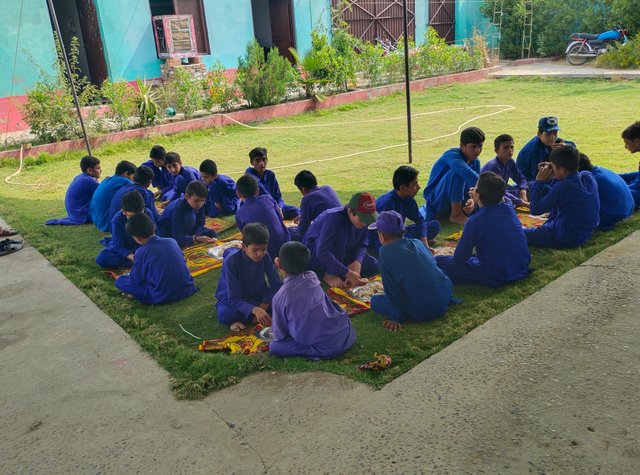Hello, dear friends! Welcome to my post. How are you all? I hope you are all doing well by the grace of Almighty Allah. I'm doing well too and having a great day.
Today, I'm excited to submit my assignment for the second week in the Teachers & Students community.
This week's assignment focuses on "Educational Management" Let's dive right in without further delay. Lets have a start .

Educational management is the art of managing a school or any other educational institution to meet the set and targeted goals of education. The prime aims are to bring improvement in the quality of education and provide an atmosphere congenial for learning. It may sound simple; however, it is a difficult task.
Educational management encompasses the following major functions:
Planning: The strategic plan of action would be devised wherein the institution would set out its goals and the steps leading to them. This ensures that the school has a well-defined direction and goals.
Organising: This function would include the development of organizational structure, division of tasks amongst staff, and work relationships. Effective organizing ensures efficient allocation of resources and clarity in tasks.
Directing: The staff has to be led, guided, and motivated towards the set goals. This function calls for leadership and decision-making that will ensure the staff works towards the attainment of the institution's objectives.
Implementing: This is the execution of all that has been planned. It involves translating policies and plans into action within the educational institution.
Controlling: This is the function concerned with monitoring and evaluating the plan implementation. It considers the assessment of progress, identification of problems encountered, and the initiation of necessary improvements that can guarantee achievement of goals.
Educational management is essential in enabling principals or senior teachers to plan the teaching and learning process effectively. If a school has a well-established educational management structure, it enables them to offer its students quality education services. Such schools are likely to contribute positively to the growth rate and development of their surroundings.
It gives a managed way of running educational institutions, which shall run smoothly for the benefit of the student, staff, and the community as a whole.

Problems in educational management are some of the reasons that hinder smooth functioning in educational institutions in Pakistan. Much as the system may appear to grapple with different managerial problems, various shortcomings still characterize the system at all levels of the educational institutions and invariably affect the quality of education and learning environments. Therefore, tackling these issues has been instrumental in making sure that schools acquire the capacity for offering high-quality education that would contribute positively to national development.
Among the main managerial problems in relation to the educational system in Pakistan are:
Inadequate Strategic Planning: The goals and mission of most of the educational institutions are not clearly spelt out, and as such, there is no proper allocation of resources to meet such needs.
Defective Organizational Structure: Most schools have indefinable roles and responsibilities, leaving members confused about their duties, which in turn give room for inefficiency in the performance of tasks.
Weak Policy Implementation: Even in cases where policies are well spelt out, implementation is always short of expectation, thereby creating a wide gap between plan and practice.
Weak Monitoring and Evaluation System: The absence of strong mechanisms to monitor and evaluate the process of implementation effectively could reduce the possibility of identifying problems and their solution in good time.
.webp)
In case the managerial problems in Pakistan's educational system are analyzed in the light of education management functions, the causes will be clear. Going through each function—planning, organizing, directing, implementing, and controlling—it is easy to identify different factors that contribute to these problems. This analysis comes foremost in précising strategies that work toward improving the quality of education and making the learning environment congenial.
The different causes of the managerial problems in Pakistan's educational system, based on education management functions, are:
Inadequate Planning: The lack of comprehensive strategic planning leads to unclear goals and objectives. Many schools do not have a well-defined roadmap that can lead to inefficient usage of resources with poor long-term outcomes.
Ineffective Organizing: In most schools, there is inefficient organizing where the organizational structure is not clear regarding roles and duties. This sometimes results in much confusion among the people working in the school, hence affecting the smooth running of activities.
Weak Directing: Principals and senior teachers fail to provide good leadership and guidance to their staff by motivating and giving directions, hence low morale and productivity among the educators.
Poor Implementation: Despite the formulation of policies and plans, their implementation is generally very poor. Most of the time, the planning phase is not linked to the practice, which results in inefficient educational programs and projects.
Inadequate Controlling: Ineffectiveness exists about monitoring and evaluation systems. In the absence of a good control system, it becomes hard to detect defects and measure progress effectively in order to take corrective action.
The managerial problems in the educational system of Pakistan demand a multifaceted approach and must target each function of educational management. More attention has to be paid to the planning function through the introduction of comprehensive strategic development at all levels of education and efficient, fair distribution of resources.

Schools have to be better organized with clearly defined roles and responsibilities for staff members in order to avoid confusion and enhance task performance. Principles of direction mean that the process needs strong leadership, and therefore principals and senior teachers need training in the art of motivating and guiding their teams.
Improving policy implementation is a matter of ensuring smooth translation of plans into practice. Moreover, there needs to be a strong monitoring and evaluation mechanism in place to provide for regular progress reviews, identification of problems, and instituting necessary improvements.
Attention toward these areas may help the educational institutions of Pakistan to improve management practices and ultimately enhance the quality of education and promote an effective learning environment.
kind Regards
@artist1111

Adieu, folks!
May the winds of fortune
carry you to greatness!
May the winds of fortune
carry you to greatness!
Upvoted. Thank You for sending some of your rewards to @null. It will make Steem stronger.
Downvoting a post can decrease pending rewards and make it less visible. Common reasons:
Submit
Jika perencanaan dalam sebuah instansi besar seperti sekolah belum jelas, maka fungsi-fungsi yang lain bisa di pastikan ikutan tidak jelas juga. Karena dasar sebuah tujuan harus di rencanakan dengan tepat dan pasti agar yang lain bisa di libatkan dengan jelas. Semangat @artis1111 semoga anda sukses.
Downvoting a post can decrease pending rewards and make it less visible. Common reasons:
Submit
Exactly! Without a clear plan, we're all lost—like searching for Wi-Fi in the middle of a forest. 😅
Downvoting a post can decrease pending rewards and make it less visible. Common reasons:
Submit
jika setiap individu mengetahui tanggung jawab dan tugasnya masing-masing, maka dapat diastika sebuah lembaga atau organisasi pasti berjalan dengan baik dan lancar
Downvoting a post can decrease pending rewards and make it less visible. Common reasons:
Submit